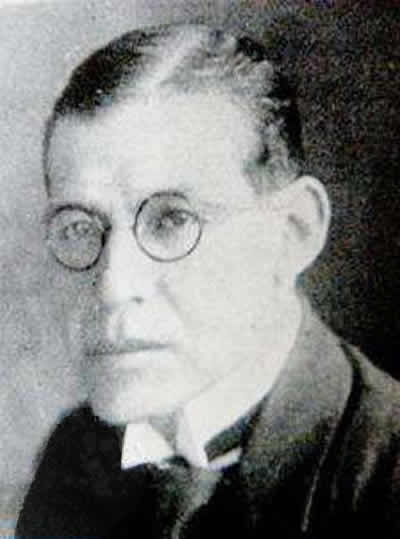Sergio Núñez Santamaría (Santa Rosa, Ambato, October 7, 1896 – Quito, 1982) was a novelist, short story writer, poet, playwright, literary critic and pedagogue. As a poet, he wrote in verse and prose, and was greatly influenced by the modernismo literary movement of Ruben Dario of Nicaragua. In 1918 he published his first poetry book, “Hostias de fuego,” with a prologue by Medardo Ángel Silva. He belonged to the “30 Generation,” a group of authors from the 1930’s Ecuador who used social realism in their fiction to denounce how Indians were treated in Ecuador. His novellas “Juego de hacienda” and “Circunferencia” are considered Indigenista fiction. A private school in Guayaquil bears his name.
Early Life and Education
Sergio Núñez Santamaría was born on October 7, 1896, in Santa Rosa, Ambato, Ecuador. He was the son of Antonio Núñez and Carmen Santamaría. For his primary and secondary education, he attended school in his hometown of Santa Rosa and completed his secondary studies at Colegio Bolívar in Tulcán.
Literary Career
Núñez Santamaría was a prolific writer, contributing significantly to various literary forms including poetry, novels, short stories, plays, literary criticism, and memoirs. His literary work was deeply influenced by the modernismo movement, particularly by the Nicaraguan poet Rubén Darío. His first poetry collection, “Hostias de fuego,” was published in 1918 and featured a prologue by Medardo Ángel Silva. This publication marked the beginning of his involvement with the “Grupo de los hermanos” (“Group of Brothers”), a literary group that included prominent figures like Medardo Ángel Silva, Rubén Irigoyen, and Aurora Estrada y Ayala.
Literary Contributions and Themes
Núñez Santamaría was a member of the “30 Generation,” a group of Ecuadorian authors from the 1930s who employed social realism to highlight the mistreatment of indigenous people in Ecuador. His novellas “Juego de hacienda” and “Circunferencia” are notable examples of Indigenista fiction, a literary movement that focused on the life and struggles of indigenous peoples.
Notable Works
- Poetry: His poetic contributions include collections such as “Hostias de fuego” (1918), “Aurora boreal” (1920), and “Visiones y ultravisiones de tierra adentro” (1948). His work “A Bolivar en la Gloria: sonata en prosa” (1952) also stands out.
- Novels: Núñez Santamaría authored novels like “Un pedagogo terrible o el vientre de una revolución” (1927) and “Árbol que no da fruto” (1929). His posthumous novellas “Juego de hacienda” and “Circunferencia” (1992) are critical works in the Indigenista genre.
- Short Stories: His short story collections include “Tierra de lobos” (1934) and “Novelas del páramo y la cordillera” (1934).
- Plays: As a playwright, he wrote several works including “La flor de Pichaví,” “Ecos de una serenata,” and “El banquete de la tierra.”
- Literary Criticism and Memoir: Núñez Santamaría contributed to literary criticism with “Nueva historia crítica de la literatura española” (1957) and wrote memoirs like “Los ríos del tiempo.”
- Anthologies: He curated anthologies such as “La poesía que vuelve” and “Las cien mejores poesías ecuatorianas.”
Professional Life and Pedagogy
Apart from his literary endeavors, Núñez Santamaría was also a dedicated educator. In 1932, he began teaching in the parish of Constantino Fernández and later taught at the Instituto Martínez in Ambato. He eventually moved to Quito, where he served as a Literature teacher at Colegio Mejiá. In Quito, he also worked at the Escuela de Artes e Industrias and co-founded the Colegio de Señoritas Riobamba, where he held the position of Vice-Principal.
Personal Life and Legacy
Sergio Núñez Santamaría’s life was marked by his deep engagement with literature and education. He spent his later years in Quito, where he passed away in 1982. His contributions to Ecuadorian literature, particularly in the realms of poetry, social realism, and the Indigenista movement, have left a lasting impact on the country’s cultural heritage. His name lives on through a private school in Guayaquil that bears his name, honoring his legacy as both a writer and an educator.
Recognitions and Anthologies
His work has been recognized posthumously, and his short stories were included in the anthology “Antología básica del cuento ecuatoriano” (1998). His dedication to exploring social issues and his efforts to give voice to the marginalized make him a significant figure in Ecuadorian literature.
Selected Works
Short story
- Tierra de lobos (Quito, 1934)
- Novelas del páramo y la cordillera (Quito, 1934) – a collection of 6 short stories.
Novel
- Un pedagogo terrible o el vientre de una revolución (1927)
- Árbol que no da fruto (Quito, 1929)
- Juego de hacienda, Circunferencia –póstumas- (Quito, 1992). Read a preview for free here.
Poetry
- Hostias de fuego (1918)
- Aurora boreal (1920)
- Visiones y ultravisiones de tierra adentro (1948; poetry and prose)
- A Bolivar en la Gloria: sonata en prosa (1952)
Biography
- Un hombre y su época ante la Historia (1952)
- Grandes hombres del Ecuador (1980)
- Figuras estelares de America
Literary Criticism
- Nueva historia crítica de la literatura española (1957)
Memoir
- Los ríos del tiempo.
Plays
- La flor de Pichaví
- Ecos de una serenata
- El banquete de la tierra
- Telaraña
- Rescoldo
- La señora se divierte
- Laberinto
Anthologies
- La poesía que vuelve (Selección antológica)
- Las cien mejores poesías ecuatorianas
- Poemas de concentración y de concejal
- Los buitres hambrientos
His work has been included in the following anthology of short stories:
- Antología básica del cuento ecuatoriano (Quito, 1998).

